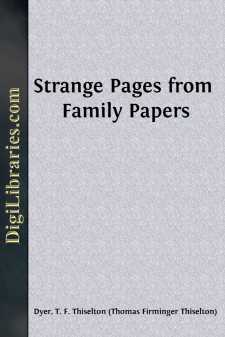Categories
- Antiques & Collectibles 13
- Architecture 36
- Art 48
- Bibles 22
- Biography & Autobiography 813
- Body, Mind & Spirit 142
- Business & Economics 28
- Children's Books 15
- Children's Fiction 12
- Computers 4
- Cooking 94
- Crafts & Hobbies 4
- Drama 346
- Education 46
- Family & Relationships 57
- Fiction 11828
- Games 19
- Gardening 17
- Health & Fitness 34
- History 1377
- House & Home 1
- Humor 147
- Juvenile Fiction 1873
- Juvenile Nonfiction 202
- Language Arts & Disciplines 88
- Law 16
- Literary Collections 686
- Literary Criticism 179
- Mathematics 13
- Medical 41
- Music 40
- Nature 179
- Non-Classifiable 1768
- Performing Arts 7
- Periodicals 1453
- Philosophy 64
- Photography 2
- Poetry 896
- Political Science 203
- Psychology 42
- Reference 154
- Religion 513
- Science 126
- Self-Help 84
- Social Science 81
- Sports & Recreation 34
- Study Aids 3
- Technology & Engineering 59
- Transportation 23
- Travel 463
- True Crime 29
Strange Pages from Family Papers
Categories:
Description:
Excerpt
CHAPTER I.
May the grass wither from thy feet! the woodsDeny thee shelter! Earth a home! the dust
A grave! The sun his light! and heaven her God.
Byron,Cain.
Many a strange and curious romance has been handed down in the history of our great families, relative to the terrible curses uttered in cases of dire extremity against persons considered guilty of injustice and wrong doing. It is to such fearful imprecations that the misfortune and downfall of certain houses have been attributed, although, it may be, centuries have elapsed before their final fulfilment. Such curses, too, unlike the fatal "Curse of Kehama," have rarely turned into blessings, nor have they been thought to be as harmless as the curse of the Cardinal-Archbishop of Rheims, who banned the thief—both body and soul, his life and for ever—who stole his ring. It was an awful curse, but none of the guests seemed the worse for it, except the poor jackdaw who had hidden the ring in some sly corner as a practical joke. But, if we are to believe traditionary and historical lore, only too many of the curses recorded in the chronicles of family history have been productive of the most disastrous results, reminding us of that dreadful malediction given by Byron in his "Curse of Minerva":
"So let him stand, through ages yet unborn,Fix'd statue on the pedestal of scorn."
A popular form of curse seems to have been the gradual collapse of the family name from failure of male-issue; and although there is, perhaps, no more romantic chapter in the vicissitudes of many a great house than its final extinction from lack of an heir, such a disaster is all the more to be lamented when resulting from a curse. A catastrophe of this kind was that connected with the M'Alister family of Scotch notoriety. The story goes that many generations back, one of their chiefs, M'Alister Indre—an intrepid warrior who feared neither God nor man—in a skirmish with a neighbouring clan, captured a widow's two sons, and in a most heartless manner caused them to be hanged on a gibbet erected almost before her very door. It was in vain that, with well nigh heartbroken tears, she denounced his iniquitous act, for his comrades and himself only laughed and scoffed, and even threatened to burn her cottage to the ground. But as the crimson and setting rays of a summer sun fell on the lifeless bodies of her two sons, her eyes met those of him who had so basely and cruelly wronged her, and, after once more stigmatizing his barbarity, with deep measured voice she pronounced these ominous words, embodying a curse which M'Alister Indre little anticipated would so surely come to pass. "I suffer now," said the grief-stricken woman, "but you shall suffer always—you have made me childless, but you and yours shall be heirless for ever—never shall there be a son to the house of M'Alister."
These words were treated with contempt by M'Alister Indre, who mocked and laughed at the malicious prattle of a woman's tongue. But time proved only too truly how persistently the curse of the bereaved woman clung to the race of her oppressors, and, as Sir Bernard Burke remarks, it was in the reign of Queen Anne that the hopes of the house of M'Alister "flourished for the last time, they were blighted for ever." The closing scene of this prophetic curse was equally tragic and romantic; for, whilst espousing the cause of the Pretender, the young and promising heir of the M'Alisters was taken prisoner, and with many others put to death....



